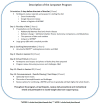The Effects of a Whole-Food Plant-Based Nutrition Education Program on Blood Pressure and Potassium in Chronic Kidney Disease: A Proof-of-Concept Study
- PMID: 40077649
- PMCID: PMC11901990
- DOI: 10.3390/nu17050779
The Effects of a Whole-Food Plant-Based Nutrition Education Program on Blood Pressure and Potassium in Chronic Kidney Disease: A Proof-of-Concept Study
Abstract
Background/objectives: Whole-food plant-based diets (WFPBDs) are beneficial in managing hypertension in the general population but have not been well studied in chronic kidney disease (CKD), potentially due to concerns about hyperkalemia. We hypothesized that individuals with CKD 3 or 4 attending a 15-day WFPBD education program would achieve lower blood pressure compared to those who did not, without an increased risk of hyperkalemia.
Methods: This was a pilot trial of 40 subjects with mild-to-moderate CKD and hypertension but without diabetes or proteinuria from a single academic center. The subjects were randomized to the 15-day education program or the control group. The changes in blood pressure, serum potassium, and other anthropometric and biochemical values were assessed.
Results: Systolic blood pressure decreased from the baseline to day 15 in the intervention group by 8 mm Hg and increased in the control group by 2.7 mm Hg, although the difference in the blood pressure change did not reach statistical significance (p = 0.12). Diastolic blood pressure was not different between the two groups. Potassium changed by 0.01 mEq/L in the intervention group and -0.07 mEq/L in the control group (p = 0.52). The intervention subjects had significant decreases in body mass (-3.0 vs. -0.12 kg, p < 0.0001), total cholesterol (-39.4 vs. -5.0 mg/dL, p < 0.0001), low-density lipoprotein (-28.4 vs. -0.6 mg/dL, p < 0.0001), and high-density lipoprotein (-8.6 vs. -0.4 mg/dL, p = 0.006) compared to the controls. The changes in albumin and phosphorus were not different between the two groups.
Conclusions: The subjects with mild-to-moderate CKD attending a 15-day WFPBD education program had a non-statistically significant reduction in systolic blood pressure without an increased risk of hyperkalemia compared to those who did not attend. The intervention subjects achieved significantly greater reductions in body mass and cholesterol without adverse effects on albumin or phosphorus. Larger and longer-duration trials using this approach in a diverse group of CKD patients are warranted.
Keywords: chronic kidney disease; education; hyperkalemia; hypertension; plant-based diet.
Conflict of interest statement
T.D.B. is the founder and president of Rochester Lifestyle Medicine Institute, which is an uncompensated volunteer position. T.M.C. receives royalties from general interest books about plant-based nutrition (Benbella Books and Penguin Random House). In addition, he has received income from a medical practice focused on lifestyle medicine (Thomas Campbell, MD PLLC). E.K.C. has no disclosures other than those of her spouse (T.M.C.). S.M.F. is on the Board of Rochester Lifestyle Medicine Institute, which is an uncompensated volunteer position. The rest of the authors have nothing to disclose. The funders had no role in the design of this study; in the collection, analyses, or interpretation of the data; in the writing of this manuscript; or in the decision to publish the results.
Figures
References
-
- United States Renal Data System . 2022 USRDS Annual Data Report: Epidemiology of Kidney Disease in the United States. National Institutes of Health, National Institute of Diabetes and Digestive and Kidney Diseases; Bethesda, MD, USA: 2022.
-
- Lv J., Ehteshami P., Sarnak M.J., Tighiouart H., Jun M., Ninomiya T., Foote C., Rodgers A., Zhang H., Wang H., et al. Effects of intensive blood pressure lowering on the progression of chronic kidney disease: A systematic review and meta-analysis. CMAJ. 2013;185:949–957. doi: 10.1503/cmaj.121468. - DOI - PMC - PubMed
Publication types
MeSH terms
Substances
LinkOut - more resources
Full Text Sources
Medical




